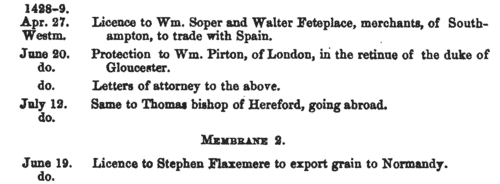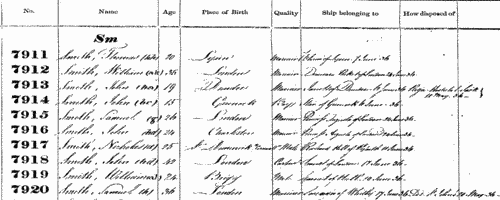Alberton Surname Ancestry ResultsOur indexes 1000-1999 include entries for the spelling 'alberton'. In the period you have requested, we have the following 17 records (displaying 11 to 17): Buy all | | | Get all 17 records to view, to save and print for £88.00 |
These sample scans are from the original record. You will get scans of the full pages or articles where the surname you searched for has been found. Your web browser may prevent the sample windows from opening; in this case please change your browser settings to allow pop-up windows from this site. Close Rolls
(1441-1447)
The close rolls of the 20th to 25th years of the reign of king Henry VI record the main artery of government administration in England, the orders sent out day by day to individual officers, especially sheriffs of shires: they are an exceptionally rich source for so early a period. There is also some material relating to Wales, Scotland, Ireland and the English possessions in France. ALBERTON. Cost: £4.00.  | Sample scan, click to enlarge

| The English in France
(1447)
King Henry VI of England (one of the grandsons of Charles VI of France) claimed the throne of France (and quartered the fleurs-de-lis of France with the lions of England on the royal standard) as had his predecessors since Edward III, as descendants of Philip IV of France. The English had real power or influence in Brittany, Normandy, Flanders and Gascony, and actual possession of several coastal garrisons, in particular Calais, where the French inhabitants had been replaced by English. Henry VI came to the throne only seven years after his father had trounced the French at Agincourt; but his cousin, Charles VII, who became king of France in the same year, spent his long reign rebutting the English king's claim to his throne by territorial reconquest and consolidation. The English administration kept a series of records called the French Rolls. On these are recorded royal appointments and commissions in France; letters of protection and safe-conduct to soldiers, merchants, diplomats and pilgrims travelling to France from England and returning, and to foreign legations. There are also licences to merchants to export to the Continent, and to captains to transport pilgrims. As Henry VI's reign progressed, and the English grip on northern France loosened, the French Rolls also increasingly include entries concerning the ransoming of English prisoners.ALBERTON. Cost: £6.00.  | Sample scan, click to enlarge

| Close Rolls
(1447-1454)
The close rolls of the 26th to 32nd years of the reign of king Henry VI record the main artery of government administration in England, the orders sent out day by day to individual officers, especially sheriffs of shires: they are an exceptionally rich source for so early a period. There is also some material relating to Wales, Scotland, Ireland and the English possessions in France. ALBERTON. Cost: £4.00.  | Sample scan, click to enlarge

|  Apprentices registered at Bristol in Gloucestershire
(1713-1715) Apprentices registered at Bristol in Gloucestershire
(1713-1715)
Apprenticeship indentures and clerks' articles were subject to a 6d or 12d per pound stamp duty: the registers of the payments usually give the master's trade, address, and occupation, and the apprentice's father's name and address, as well as details of the date and length of the apprenticeship. There are central registers for collections of the stamp duty in London, as well as returns from collectors in the provinces. These collectors generally received duty just from their own county, but sometimes from further afield. July 1713 to April 1715. For some reason, the Bristol collector was the only one in the country to make his return in Latin. (The sample entry shown on this scan is taken from a Norfolk return)ALBERTON. Cost: £8.00.  | Sample scan, click to enlarge

|  British merchant seamen
(1835-1836) British merchant seamen
(1835-1836)
At this period, the foreign trade of ships plying to and from the British isles involved about 150,000 men on 15,000 ships; and the coasting trade about a quarter as many more. A large proportion of the seamen on these ships were British subjects, and so liable to be pressed for service in the Royal Navy; but there was no general register by which to identify them, so in 1835 parliament passed a Merchant Seamen's Registration Bill. Under this act this large register of British seamen was compiled, based on ships' crew lists gathered in British and Irish ports, and passed up to the registry in London. Each seaman was assigned a number, and the names were arranged in the register by first two letters of the surname (our sample scan shows one of the pages for 'Sm'); in addition, an attempt was made to separate out namesakes by giving the first instance of a name (a), the second (b), and so on. But no effective method was devised to prevent the same man being registered twice as he appeared in a second crew list; moreover, the original crew lists were clearly difficult for the registry clerks to copy, and some of the surname spellings appear to be corrupted. A parliamentary committee decided that the system devised did not answer the original problem, and this register was abandoned after less than two years: but it is an apparently comprehensive source for British merchant seamen in 1835 to 1836. The register records the number assigned to each man; his name; age; birthplace; quality (master, captain, mate, 2nd mate, mariner, seaman, fisherman, cook, carpenter, boy &c.); and the name and home port of his ship, with the date of the crew list (usually at the end of a voyage). Most of the men recorded were born in the British Isles, but not all (for instance, Charleston and Stockholm appear in the sample scan). The final column 'How disposed of' is rarely used, and indicates those instances where a man died, was discharged, or deserted his ship during the voyage.ALBERTON. Cost: £8.00.  | Sample scan, click to enlarge

|  British merchant seamen
(1840-1844) British merchant seamen
(1840-1844)
The registry of merchant seamen, including fishermen, sought to identify individuals securely in this series of registers by assigning to each man a unique number, grouped together by surname, and then by christian name, whereas in previous registers names had been jumbled together under the first two letters of the surname. Each man's age and birthplace was recorded, together with any number brought forwards from previous registration, i. e. the number assigned to the man in the registers for 1835 to 1840. Then each voyage is listed, with his status (e. g. S for seaman, M for mate, &c.) on that trip, the identification number of the ship, the date, and then the name of the ship. In the event of it becoming known that a man had died during the course of a voyage, that information is written across the remaining empty columns. This volume (BT 112/1) covers seamen whose surnames start with A or McA.ALBERTON. Cost: £8.00.  | Sample scan, click to enlarge

| Corporate Secretaries
(1928)
The Chartered Institute of Secretaries of Joint Stock Companies and other Public Bodies was founded in 1891 and incorporated by royal charter in 1902. This membership list (corrected to 2 October 1928, and printed in the annual Proceedings), arranged alphabetically by surname and initials, gives the year of being elected Associate (A.) and/or Fellow (F.), and current professional office. As of 31 August 1928 there were 2201 fellows and 3907 associates. ALBERTON. Cost: £4.00.  | Sample scan, click to enlarge

|
 | 1 | 2 |
Research your ancestry, family history, genealogy and one-name study by direct access to original records and archives indexed by surname.
|










